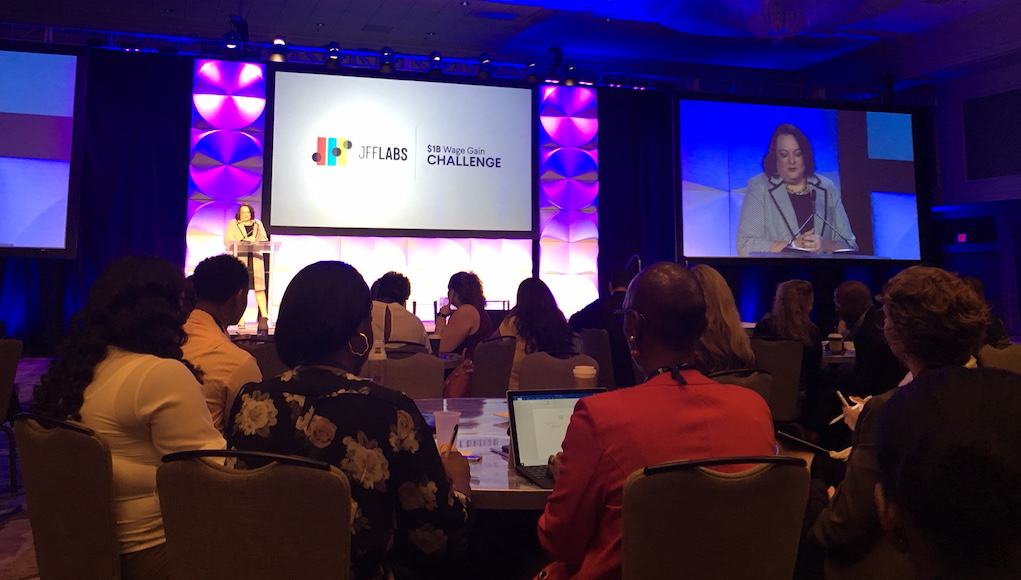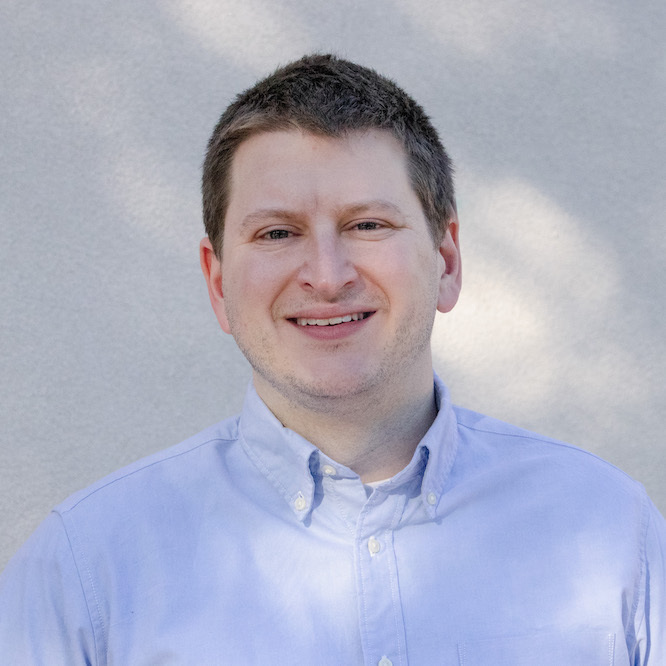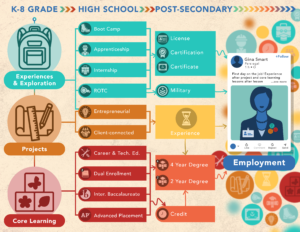JFF Horizons: Building New Bridges to the Future of Work and Learning

Last week I attended JFF (Jobs for the Future) Horizons, a conference that served as a powerful reminder that we won’t be able to prepare our students for the rapidly changing world and technologies like AI if our education, policy, and private sector systems continue operating in silos, and that highlighted creative ways to conceptualize and build new partnerships and bridges between those sectors.
This is a huge, complicated, beast of a challenge, but represented at Horizons were a few new initiatives and ideas in particular that powerfully illustrated the power of cross-sectoral collaboration, and that give me hope that these partnerships will continue to accelerate progress until, hopefully sooner rather than later, our society catches up to the changes that technology is bringing. I won’t bore you by talking about how great the conference itself was (it was, though–and I’m not just saying that because Getting Smart was media sponsor for the event), but instead want to dive into some fresh ideas being advocated for by the people who attended and presented at Horizons, who are making big and interesting efforts in this area.
“We’re not trying to protect the status quo,” said JFF President & CEO Maria Flynn.
1. Incubating Innovations through Cross-Sector Collaboration
At the event, JFF announced the launch of the first round of big initiatives from JFFLabs, the new innovation engine of the organization that will be focused on the increasing roles that technology and corporations play in workforce, education, and training, and that will serve as a sandbox for prototyping, incubating and experimenting with “big thinkers” and “big ideas.”
Their previous and current Entrepreneurs in Residence (EIRs) demonstrate the type of people and advisors they are bringing to the table:
- Katrina Stevens, now Director of Learning Science, Chan Zuckerberg Initiative
- Sonali Kothari, COO/CPO of Kiva
- Josh Copus, formally COO of National Association of Workforce Boards
Their effort to align and accelerate the field’s understanding and working relationships with technology-enabled startups (both for-profit and non-profit) includes initiatives such as:
- Publishing market research and maps (for example, their recent Promising Trends and Challenges in Work-Based Learning: A Market Scan of Organizations and Tools)
- Curating good companies to spotlight (they announced, at the event, the launch of a new Work-Based Learning cohort)
- Forming customer councils or test demo sites (similar to how they worked with Persistence Plus) which will be focused on trying new solutions and giving feedback on the results
- Advising corporations on solutions as they design new workforce and talent development strategies that require technology-enabled scale.
Additionally, their effort to create a “sandbox” for incubating the development of technology-enabled solutions, “moonshot initiatives” and grand innovation challenges, will include initiatives such as:
- The AWAKE initiative. AWAKE stands for “Advancing Workforce Analytics and Knowledge Exchange,” and it is aimed at using technology, data and regranting to augment how workforce development boards bolster local operations, capacity, effectiveness and begin shifting to a consumer-centric model of technology delivery and outcomes measurement.
- The $1 Billion Wage Gain Challenge will be a grand competition inviting people to submit proven, underway and hypothetical ideas that deliver a $10,000 wage gain increase for 100,000 Americans. This competition will launch on Labor Day, 2018
- MyBestBets is a career discovery and navigation platform that was incubated at JFF and represents how future initiatives can be technology-enabled.
Breaking! With @SchmidtFutures we’re hosting a grand challenge to find the nation’s most effective and promising ways to meaningfully increase annual incomes and help close the #wagegap https://t.co/kPZetQrHUu #jffhorizons
— JFF (@jfftweets) June 13, 2018
As the future of work rapidly becomes today’s reality, radically new models for how workers, corporations, funders, traditional systems, and communities interact will emerge.
2. Efforts to Design Solutions and Systems Must Still Focus on Equity.
Fresh approaches to creating more equitable systems ranged from Stephanie Lampkin’s AI-based approach to removing bias from the hiring process, to Zoran Popovic’s EnLearn, to the final panel highlighting ambitious young people from disadvantaged backgrounds who are nonetheless finding success. Overall, the event served as a great reminder that we can’t move the needle forward without doing so for everyone.
How @blendoor @stephaneurial is removing unconscious bias from hiring. Goes beyond removing names to expanding the way we assess talent & fit #jffhorizons pic.twitter.com/LctiAIIw25
— Persistence Plus (@student2grad) June 13, 2018
How do we achieve equity in learning? Personalization of learning and meeting learners where they are at, says @ZoranPopovic, Founder of @EnlearnOrg at #jffhorizons. pic.twitter.com/uWmIn4LtXu
— ECMC Foundation (@ECMCFoundation) June 13, 2018
3. Putting Money to Work.
A large amount of money is spent on the education industry every year. How can it be used most effectively? There were three moments that stuck out to me as really solid food for thought:
Joseph Fuller, Professor of Management Practice at Harvard, argued: “Instead of asking ourselves how we can do what we’ve been doing better, we need to ask ourselves: Why is what we’re doing now not achieving the results we want?”
Verna Eggleston, who leads women’s economic development initiatives at Bloomberg Philanthropies, shared that, “In my 40 years of work I’ve found folks who have the will but lack access, and I’ve found folks whose will has been broken but who have access to all the grants and social capital in the world… Philanthropy’s greatest opportunity is to be the bridge between access and will.”
“If you believe in equity, if you believe in people having better lives, we need to have the economic foundation,” argued Jason Palmer of New Markets Venture Partners. What are the metrics for a “good job,” he asked, and how can we invest in (and incentivize investments in) companies and services that create them?
A market can’t function well without a strong demand signal. This is why employer-driven initiatives are key to building inclusive economies! @byron_auguste at #JFFHORIZONS pic.twitter.com/WuOotywSeP
— Laura Faulkner (@L_Faulkner_) June 13, 2018
4. Experiential K-12 Learning is a Promising Path Forward.
One mini-plenary that stuck out to me featured Lydia Dobyns, President & CEO of New Tech Network; Elliot Washor, Co-Founder of Big Picture Learning; a student from one of each of their schools; and Loretta Goodwin, Deputy Director of the American Youth Policy Forum as moderator. The students in the room, who had taken part in rigorous work-based/experiential programs and who are now preparing for college, did much of the talking, and it was refreshing to hear student success stories first-hand.
I also learned of some new resources from JFF including their Work-Based Learning Framework, and their new report, Promising Trends and Challenges in Work-Based Learning: A Market Scan of Organizations and Tools.
This is something I’ve seen a lot of recently (Northeastern University’s NExT initiative jumps to mind), and seeing it clearly present as an undertone throughout the conference reaffirmed to me that momentum for experiential learning is growing.
5. New Forms of Credentials Are Needed.
We’ve been thinking a lot about the high school credential (and how we might rethink it), so it admittedly may have been a bit of cognitive bias that made me zero in on this, but that being said: there was a lot of discussion about how we communicate learning and skills at Horizons.
“We have to find a way to look beyond traditional credentials–to create pathways of credentials that allow people to move into earning ranges that will allow them to take care of their families,” said Monty Sullivan, President of the Louisiana Community & Technical College System, in reference to Louisiana’s work to remove the high school diploma as a barrier to community college participation.
Loving this topic – Resumes are outdated. What will replace it?? #JffHorizons @jfftweets @amazon @OpptyatWork @AmericanAir @SkillistCo pic.twitter.com/wgYS7u7Ws5
— Charlotte Lysohir (@charlotte_evel) June 13, 2018
edX CEO Anant Agarwal’s discussion ended with him saying that if he had a magic wand and could make one wish, it would be to make people rethink learning credentials in order to make them more modular.
Getting Smart will be releasing an in-depth white paper on the landscape of Competency-Based Education in mid July, which will examine how CBE can be a valuable tool for accelerating the shift toward a system in which students are able to more efficiently able to demonstrate their knowledge and skills and progress through learning.
In Conclusion:
I left JFF Horizons feeling inspired, if a little overwhelmed, by the potential for progress toward a better future for more Americans. As Maria Flynn, President & CEO of JFF, said, “The future of work isn’t just happening to someone else. It’s happening to all of us.” With 800 national leaders in education, workforce, and tech innovations, the conference was a step forward in generating solutions that will improve America’s education and talent development systems to meet the needs of our rapidly changing economy.
I also think it will be worthwhile to keep an eye on JFFLabs, with the $1 Billion Wage Gain Challenge being a great example of one of those things to keep in mind the next time your cleverest friend has a good idea–it might just come to life.
For more, see:
- PBL World Educators Focus on Process
- Deeper Learning 2018 | Powerful Adult Learning
- Project-Based Pittsburgh: Thinking Beyond Schools to Remake Learning
Stay in-the-know with all things EdTech and innovations in learning by signing up to receive the weekly Smart Update. This post includes mentions of a Getting Smart partner. For a full list of partners, affiliate organizations and all other disclosures, please see our Partner page.





0 Comments
Leave a Comment
Your email address will not be published. All fields are required.